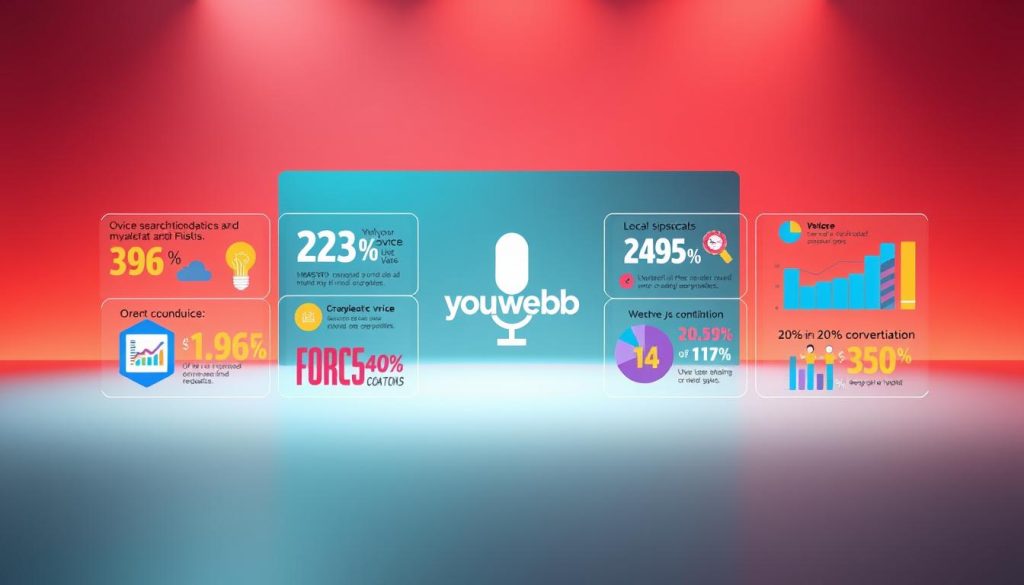Voice Search Optimization: Boost Your Online Presence
Voice search optimization is the process of improving your online presence so you appear for voice search queries. This means your website and content are optimized to be read aloud by voice assistants like Google Assistant, Siri, Cortana, and Alexa when users perform a voice search.

As voice search continues to grow, with millions using smart speakers and phone assistants, it’s crucial for businesses to adapt. We help you make your website more visible and improve your online presence through simple, proven strategies.
At YouWebb, we build clear strategies that help you get found, drive more leads, and grow faster. By optimizing for voice search, you can stay ahead of the competition and achieve real results.
Key Takeaways
- Understand how voice search is changing the way people find businesses online.
- Learn simple ways to make your website more visible in voice search results.
- Discover how to adapt your online content to match natural speech patterns.
- Implement strategies to drive more leads and grow your business through voice search.
- Stay ahead of the competition with a clear plan for voice search optimization.
Understanding Voice Search Optimization
The rise of voice search technology necessitates a deeper understanding of voice search optimization strategies. As we increasingly rely on voice assistants like Siri, Alexa, and Google Assistant, the way we search for information online is changing. This shift requires businesses to adapt their online presence to remain visible and competitive.
What Is Voice Search Optimization?
Voice search optimization involves making your website and content more accessible to voice assistants. It’s about understanding how people use voice search and optimizing your content to match their queries. By doing so, businesses can improve their chances of being featured in voice search results, driving more traffic to their website.
Voice search optimization is becoming essential for businesses of all sizes. It’s not just about being found; it’s about providing users with the information they’re looking for in a conversational manner.
How Voice Search Differs from Text-Based Search
Voice search queries differ significantly from text-based searches. When using voice search, people tend to use full sentences or questions, such as “Hey, Siri, can you find an Italian restaurant nearby?” In contrast, text-based searches are often shorter and more concise, like “Italian restaurants near me.” Understanding these differences is crucial for businesses to optimize their content effectively.
By recognizing how voice search queries are more conversational and often phrased as questions, businesses can tailor their content to match the way their customers search. This involves using long-tail keywords and phrases that reflect natural speech patterns.
The Growing Importance of Voice Search
The growing importance of voice search is evident in its increasing adoption across various age groups. As technology advances, more people are using voice assistants for a variety of tasks, from setting reminders to searching for information online.
Current Voice Search Usage Statistics
Recent studies have shown a significant rise in the use of voice search. Nearly 60% of consumers between the ages of 25 and 34 use voice search daily. As of 2024, voice assistants are the most popular AI-powered smartphone feature among US adults. This trend is expected to continue, with analysts predicting that the voice assistant market will add more than 20 million users by 2028 and reach a value of nearly $32 billion by 2033.
- Daily voice search usage is high among younger consumers.
- Voice assistants are a preferred feature on smartphones.
- The voice assistant market is projected to grow significantly.
Benefits of Voice Search Optimization for Businesses
Optimizing for voice search can bring numerous benefits to businesses. By doing so, companies can increase their online visibility, build trust with their customers, and improve user experience. As voice search continues to grow, businesses that optimize for it now will have a competitive advantage in the future.
- Enhance your online presence through voice search optimization.
- Build customer trust by being readily available through voice search.
- Improve user experience by catering to voice search queries.
By understanding the importance of voice search and adapting to this trend, businesses can stay ahead of the curve and reap the benefits of this growing technology.
How Voice Search Technology Works
The mechanics behind voice search are more complex than you might think. At its core, voice search technology relies on artificial intelligence (AI) and natural language processing (NLP) to understand and respond to user queries.
Popular Voice Assistants and Their Search Engines
Many users access voice search through digital assistants like Siri, Alexa, and Google Assistant. These assistants use different search engines to provide results. For instance, Siri relies on Google, while Alexa uses Bing. Understanding these differences is crucial for optimizing your content.
- Siri uses Google for search results
- Alexa relies on Bing for information
- Google Assistant uses Google Search
Voice Search Result Formats
The format of search results varies depending on the device and assistant used. Some results are delivered as spoken answers, while others are displayed visually on a screen. For example, a query on Google Assistant might show a list of results on a smartphone, while Alexa might read out a single answer.
Key formats include:
- Spoken answers
- Visual results on a screen
- Listings on a device with a display
Optimizing Content for Voice Search Queries

As voice search continues to grow, optimizing your content for voice queries is becoming increasingly important. Voice searches tend to use more conversational language than traditional text-based search queries. Instead of typing “best outdoor activities Santa Fe,” a user might say, “Hey Siri, what are some fun things to do outside in Santa Fe?”
Using Conversational Language
To improve search engine visibility for voice requests, we create clear content that avoids overly formal or technical language. We incorporate conversational keywords to make our content sound more natural. This approach helps us match the way people actually speak when using voice search.
Targeting Question Keywords
Pay particular attention to question keywords like “What’s the best Vietnamese fish sauce brand?” or “Where can I find comfortable heels for wide feet?” We can include these question keywords and their concise answers in an FAQ section for a more natural content flow.
Incorporating Long-Tail Keywords
Voice searches are typically longer than traditional text-based searches. Most users speak faster than they type and include more information and a higher number of words in each query. We can use long-tail keywords (phrases with 3+ words) to capture these voice searches. By incorporating these keywords, we can create content that answers specific questions and provides valuable information to users.
By implementing these strategies, we can transform traditional content into voice-search-friendly content that resonates with our audience. This approach not only enhances our search engine visibility but also improves user engagement.
Technical Voice Search Optimization Strategies
Voice search optimization goes beyond content creation. To truly excel, you need to focus on the technical aspects that make your website more accessible and understandable to voice assistants.
Improving Website Speed and Performance
Website speed is crucial for voice search optimization. A fast-loading site improves user experience and can boost your search engine rankings. To enhance your website’s speed, optimize images, leverage browser caching, and minimize HTTP requests. These steps can significantly improve your site’s performance, making it more likely to be featured in voice search results.
Mobile Optimization for Voice Search
With over 27% of mobile users utilizing voice search, having a mobile-friendly website is no longer optional. Ensure your site is responsive and provides a seamless experience across all devices. Mobile optimization is key to capturing voice search traffic, as it directly impacts your site’s visibility and usability on mobile devices.
Implementing Schema Markup
Schema markup is a powerful tool that helps search engines understand your website’s content. By adding schema markup to your site, you can provide voice assistants with the context they need to deliver accurate results. Focus on implementing schema for key business information, such as hours of operation, address, and reviews. This structured data can significantly enhance your site’s visibility in voice search results.
Local SEO for Voice Search Success

Voice search is changing the way people find local businesses, and we’re here to help you adapt. Local search queries are among the most common voice search queries, and optimizing for them can drive valuable traffic to your business.
Optimizing Google Business Profile
To appear on Google Maps and in location-based Google searches, you need to set up a Google Business Profile. Make sure to include up-to-date contact details, hours, and website links. This will help voice assistants use your business information to answer local queries like “restaurants near me” or “closest hardware store.”
By optimizing your Google Business Profile, you’ll increase your chances of being the top recommendation when people in your area use voice search to find products or services like yours.
Building Local Citations and Directories
In addition to optimizing your Google Business Profile, you should also build local citations and directories. Add your company to other search engine directories like Bing Places and Apple Maps, and local business listings like Yelp and the Yellow Pages. This will help voice assistants find your business information and increase your online visibility.
By following these local SEO strategies, you can make your business more visible in voice search results and drive more traffic to your website.
Capturing Featured Snippets for Voice Search
Capturing featured snippets can significantly boost your voice search visibility. Voice assistants rely heavily on these snippets to provide quick answers to users’ queries. By optimizing your content to appear in featured snippets, you can increase your chances of being the source of voice search results.
How Featured Snippets Impact Voice Search Results
Featured snippets are short excerpts that appear at the top of search engine results pages. A study found that 70% of voice search answers come from featured snippets. This makes them crucial for voice search success. Voice assistants like Siri and Alexa use these snippets to answer questions, making it essential to be in “position zero” for voice search queries.
Strategies to Win Featured Snippets
To capture featured snippets, focus on providing direct, high-quality answers to common search questions. Use keyword-rich headings and subheadings to structure your content. Format your answers using numbered steps or bullet points when applicable. Additionally, consider implementing schema markup to help search engines understand your content.
- Provide clear and concise answers to common questions.
- Use structured formatting like numbered lists and tables.
- Optimize your content with relevant keywords.
- Utilize schema markup to enhance search engine understanding.
Conclusion: Taking Action on Voice Search Optimization
As voice search continues to grow, businesses must prioritize voice search optimization to remain competitive. Optimizing your online presence for voice queries is no longer a one-time task, but an ongoing process that requires regular audits and adjustments to stay ahead in search engine results.
To get started, focus on creating high-quality, conversational content that targets long-tail keywords and answers specific questions. Ensure your website is mobile-friendly and has a fast loading speed, as these are crucial factors for voice search results. Additionally, optimize your Google Business Profile to improve local search visibility.
- Summarize key strategies for voice search optimization, including using conversational language and targeting question keywords.
- Create a simple checklist to start improving your voice search visibility right away.
- Understand that voice search optimization is an ongoing process, requiring continuous monitoring and adjustments.
- Learn how to measure the success of your voice search optimization efforts and track improvements.
At YouWebb, we build clear, proven strategies that help businesses get found online, drive more leads, and grow faster. Our team is excited to help you succeed with voice search optimization. Ready to grow your business? Contact us today at (508)816-1101 to learn more about our services and how we can assist you in achieving your goals.
By acting now on voice search optimization, your business will have a significant advantage as this technology continues to evolve. Stay ahead of the competition and ensure your online presence is optimized for the future of search.
FAQ
What is the importance of optimizing for voice search?
How does voice search differ from text-based search?
What are the benefits of using schema markup for voice search?
How can I optimize my Google Business Profile for voice search?
What role do featured snippets play in voice search results?
How can I improve my website’s speed and performance for voice search?
What is the significance of long-tail keywords in voice search?
How can I target question keywords for voice search?
Explore More Services That Drive Results
Looking to grow faster and rank higher? Our full suite of digital marketing solutions is designed to help local businesses generate leads, increase visibility, and convert more traffic. Whether you’re starting from scratch or scaling aggressively, these related services can work together to accelerate your success.
Related Marketing Services:
- SEO Services – Improve your rankings and attract high-intent traffic with proven on-page and off-page SEO strategies.
- Custom Web Design – Get a fast, mobile-friendly website that builds trust and turns visitors into leads.
- Content Marketing – Engage your audience and boost authority with keyword-rich blog posts and service pages.
- Rank & Rent – Rent a pre-ranked website in your city and start receiving exclusive leads instantly.
- Local SEO – Optimize your visibility in local search and Google Maps to win nearby customers.
- Home Services SEO – Drive calls, bookings, and leads for your home service business with targeted SEO.
- Healthcare Providers SEO – Grow your patient base with SEO strategies built for medical and dental professionals.


